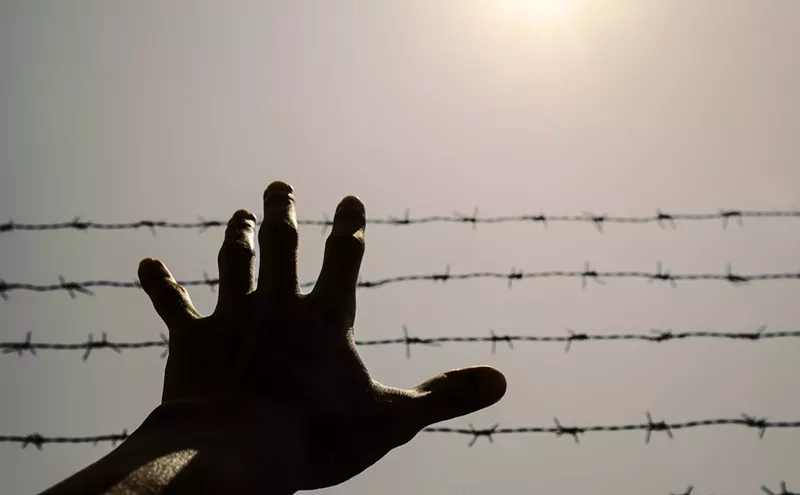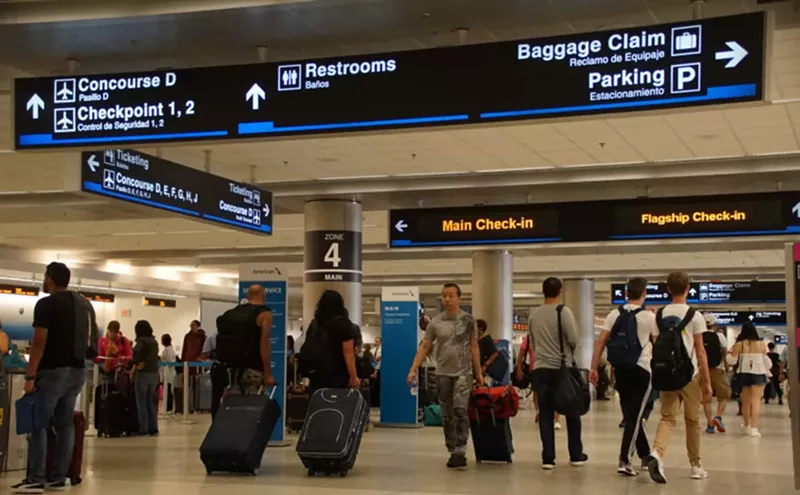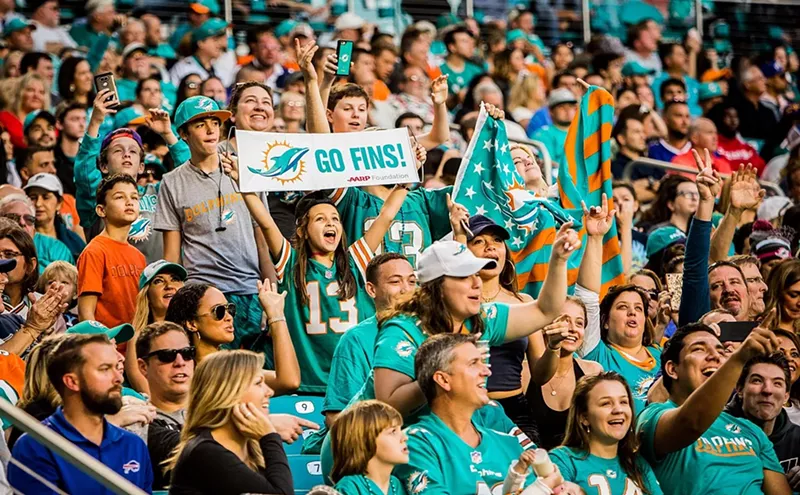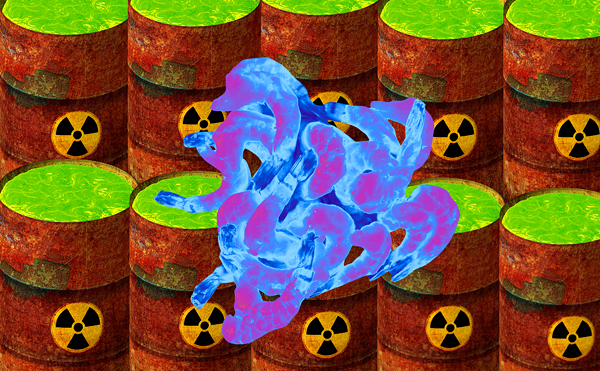Pelting rain has glued red-and-yellow-striped jerseys onto the soaked bodies of 6,000 fans scattered around Lockhart Stadium's metal bleachers. The waterlogged pitch looks more like a World War I battle site than a soccer field, but the true believers in the stands chant and sing ecstatically. For the first time in more than two decades, their Fort Lauderdale Strikers are competing in a championship game.
After the opening whistle, though, the contest plays out about as well as the weather. The Strikers had already lost the first of a two-game fight for a North American Soccer League (NASL) title to the Minnesota Stars. As pass after pass is intercepted or misdirected over the wrecked turf, the home team's two-goal deficit begins to look insurmountable.
Midway through the second half, the Strikers' chance comes at last. Wálter Restrepo, a diminutive, speedy midfielder from San Diego, streaks past a defender and whips a cross into the Stars' box. It caroms off two players, flies toward the net — and then rolls just wide of the post. The crowd deflates.
Half an hour later, the final whistle blows. The Stars are champions. A few hundred sopping fans stick around to applaud the Strikers as they slog back to the locker room. The loss hurts, but for a squad toiling in America's obscure second division — and in front of a small, devoted home crowd — making it to that title game is a giddy high point.
"We had a very good product on the field," says Daryl Shore, the team's head coach at the time of that October 29, 2011 finals and now a goalkeeper coach for Real Salt Lake. "And we did it in a tough situation, where everyone in South Florida still viewed this as minor-league soccer."
The Strikers' nadir, though, would come just a few weeks later, with a message from team president Aaron Davidson. A long-haired whirlwind of energy, Davidson cut a larger-than-life figure in South Florida's sleepy soccer scene, speaking five languages and helming the entire NASL, a renegade league he'd helped form as part of a mad plot to topple the more popular and better-funded Major League Soccer.
"You start with the soldiers, get them to turn on the people above them."
tweet this
Now, in the wake of the Strikers' greatest on-field accomplishment, Davidson had bad news for the team's leadership: He was slashing the payroll by $200,000. For an already-bare-bones operation, it was a brutal blow.
"I was shocked," says Andy Herron, a Costa Rican international who was the team's star forward. "There were already players making basically nothing. I'm pretty sure they could have made more money by coaching kids' teams."
Why cut spending after the Strikers' most successful campaign? According to federal prosecutors, Davidson was about to throw millions into another, far shadowier venture. Within weeks of taking a machete to his team's finances, Davidson was allegedly engineering massive bribes — artfully hidden in offshore transfers to pool companies and soccer ball manufacturers — so he could land lucrative marketing contracts for soccer tournaments.
This past May, the lurid details of that scheme were outlined in a blockbuster indictment leveled by U.S. Attorney General Loretta Lynch against 14 international soccer figures. It shook the world's most popular sport to its core.
The story of Aaron Davidson — the only American-born defendant charged in the vast case — has mostly been lost amid tabloid-worthy tales of blatant graft funding luxury penthouses in New York City, palatial estates in Trinidad, and gala lakefront parties in Switzerland. But Davidson's downfall is operatic in its own way. It's the stunning undoing of a brilliant, exasperating would-be visionary, an Alex P. Keaton-like prodigy with world-conquering dreams who lived in a million-dollar Brickell Key condo and jetted around the globe with soccer stars.
Now, Davidson — who declined to comment for this story — might be set for a new starring role. As he contemplates a potential plea deal with federal prosecutors, the Miami exec might just hold the key to starting a legal chain reaction that leads all the way to FIFA's widely despised Swiss chairman, Sepp Blatter.
"You usually see these types of mass prosecutions in racketeering cases going after the Mob or big drug organizations," says Scott Sundby, a University of Miami law professor and former federal prosecutor. "You start with the soldiers, get them to turn on the people above them, and eventually, hopefully, you get all the way to the top."
Even in the world's most global sport, Aaron Davidson's border-melting background regularly sparked confused conversations on soccer sidelines. What kind of place, exactly, spawned this handsome figure with salt-and-pepper hair and an ease in speaking Spanish, Portuguese, Hebrew, French, and English?
"I'm a Tex-Mex-Costa Rican Jew," he once told a reporter. "I'm my own little tribe."
In fact, Davidson is all of those things, but most important — at least in explaining his dogged rise and abrupt fall — he's the son of an immensely successful and demanding father.
Jaime Davidson was born in Costa Rica in 1945, three years before a civil war that left thousands dead but also ushered in Central America's most stable democracy. His parents were Eastern European Jews who'd fled to safety across the Atlantic. After graduating from a Costa Rican college, Jaime moved north to study at Universidad Nacional Autónoma de México in Mexico City. He was only 23 years old when he earned his medical degree. He also met his wife there. Ana was a Mexican beauty who, like Jaime, was descended from European Jewish expats.
Aaron was born in 1970, soon after his parents moved to America for Jaime's medical residency. The first post was in Temple, Texas; then came Indianapolis; and finally Dallas' Methodist Hospital. The young family, which included Aaron's brother Maurice, moved to the Big D's northern suburbs as Jaime developed his specialty: research and treatment of diabetes.
The striking doctor with a full mustache and an intelligent, open face rose to national prominence in his field. In the early '90s, he helped found the American Association of Clinical Endocrinologists, and Gov. Ann Richards appointed him chair of the Texas Diabetes Council. Costa Rica even made him an honorary consul. In Dallas' Jewish circles, he became a well-known leader, donating to local synagogues and starting medical programs in Israel.
"He is a pillar of the whole community," Uri Burstein, who befriended Aaron as a kid in North Dallas, says of Jaime. "For Aaron, I believe that meant a lot of pressure coming from his parents and his family to succeed."
At the Greenhill School, an exclusive prep academy on more than 75 rolling acres north of Dallas, the younger Davidson spent his time in bookish cliques like a French club and an international studies group. In his senior photo, he smiles confidently in a double-breasted suit fit for a corporate exec, his hair perfectly parted to the left. Asked to describe him for his yearbook profile, his classmates offered bland praise: "Smart," "good guy," and "good sense of humor" made his list of adjectives, along with ribbing for his regular "raccoon eyes" from family ski trips.
"He was very scholarly, just intelligent and very charismatic," Burstein says. "He just always seemed to be ahead of everyone else academically."
Unlike his father's trajectory, though, Aaron's brains and drive didn't translate into a clear career path — at least, not until 1993, just after he graduated from Atlanta's Emory University. That's when he chanced to meet a towering figure of American soccer in Miami.
Chuck Blazer is perhaps the most flamboyant, impossible-to-invent character in modern sports. An obese, heavily bearded New Yorker, Blazer turned a successful '70s business selling a novelty button — the one with the yellow smiley face that read "Have a Happy Day" — into consulting work for local soccer teams. In 1988, he moved south to take over the Miami Sharks, a minor-league club playing to tiny crowds at the Orange Bowl. Within two years, the Sharks had folded with disastrous finances, in part because Blazer had paid himself $72,000 per year plus lodging at a waterfront hotel, all while drawing fewer than a thousand fans a game. Despite that catastrophe, the Teflon Blazer soon wrangled a new gig: running CONCACAF, which is in charge of international soccer in all of North and Central America and the Caribbean.
Davidson, then a fresh-faced 23-year-old, later told colleagues he had met Blazer the eve of the first World Cup held in the United States. Soon afterward, the multilingual student landed a job as a translator at the global tournament.
It wasn't a natural path for Davidson. Despite his Latin American heritage, he hadn't grown up a fútbol fanatic. "We weren't in households where soccer was a way of life," Burstein says. Their families were more likely to watch Cowboys games together, he says.
Working at the World Cup changed all of that. But it would be another decade before Davidson found a way to make the beautiful game his full-time job. First he netted a law degree from Southern Methodist University in Dallas and briefly worked abroad in Chile and France. After law school, he started a sports marketing company and ran a golf tournament in Mexico.
His big break came in the early '00s, when he helped negotiate a TV deal that involved the booming Brazilian firm Traffic Sports. Founded two decades earlier by ex-sports journalist Jose Hawilla, who foresaw the burgeoning market for TV rights to big games, Traffic employed thousands in Brazil to work on soccer marketing deals. Impressed with Davidson's language skills and legal background, Hawilla brought the young attorney to Miami in 2003 to run his smaller U.S. operations.
The company was a perfect fit for Davidson, who set up shop in a plush office next to the Mandarin Oriental on Brickell Key. He soon installed a foosball table in the glass-walled lobby lined with framed jerseys. And he met a young University of Miami law school graduate, Michelle Dryjansky, a Mexican Jew like his mother. They married in 2005 in Mexico City.
The next year, with the financial backing of Traffic, Davidson moved fully into the limelight with a bold move that would land him — in soccer circles at least — in a job every bit as visible as his father's globetrotting medical career.
Miami had been without professional soccer since 2001, when the MLS's Miami Fusion dissolved. In fact, professional soccer had failed time and again in the Magic City. Eight franchises had folded since the '70s. But this time, Davidson promised, his new team — a second-division club called Miami FC — would be different.
"I believe Miami FC will forever be the professional soccer team of Miami," Davidson confidently told the Miami Herald. "We are fully committed to being here for a long, long time."
"Does South Florida truly want a professional soccer team?" Davidson pleaded, exasperation dripping from the pages of a letter sent to local media outlets.
It was February 2009, and he had tried everything in the prior three years: signing aging superstars, buying banners on light poles all over Brickell, slashing ticket prices. Nothing worked. No one cared about Miami FC. And now his Brazilian investors were threatening to pull the plug.
As Davidson's soccer dreams fizzled in Miami, a dark side of his personality emerged, according to former employees. The intense workaholic turned petty and vindictive, micromanaging everything while money became so tight that interns had to buy copy paper with their own money.
"He was never, ever satisfied with what people did," says Kartik Krishnaiyer, who spent three years as director of communications under Davidson.
Adds another longtime team employee, who asked not to be identified by name: "I literally had to see a psychiatrist after working for him."
The picture they paint of Davidson's reign at Miami FC stands in stark contrast to his cool public persona and also hints at how he may have ended up at the heart of an international bribery conspiracy. A man so driven to succeed, they say, wouldn't have let the threat of international felony charges stand in the way of closing million-dollar marketing contracts.
"He was a businessman at heart," says Ken Mendonça, a former communications manager for the soccer club, "and he lived for making the big deal."
At first, Davidson concentrated on a tried-and-true method of luring fans: buying big-name stars well past their expiration date. That plan had briefly helped American soccer thrive in the '70s, when Pelé played for the New York Cosmos and the likes of Ray Hudson and Gerd Müller drew big crowds for the Fort Lauderdale Strikers.
But Davidson's biggest coup — signing Romário, the '94 World Cup MVP and a Brazilian legend — didn't bring out spectators for Miami FC's inaugural 2006 campaign. (It didn't help that Romário was then 40 years old and fonder of clubbing than practicing. "Romário, in recent years, has not been the kind of player who has trained on a daily basis," Davidson sheepishly admitted to New Times when the former superstar's calf muscle promptly blew out.)
In three years of playing at Tropical Park, Davidson's team never cracked 2,000 fans per game. By 2009, as MLS flirted with bringing a team to town, he was desperate. In a letter sent to the media and supporters, he essentially begged for season ticket sales. He signed a pair of recent Cuban exiles in hopes of enticing baseball-mad Little Havana residents, offered to make tickets valid for a future MLS franchise, and hacked prices — to no avail. "Miami FC was a disaster," Krishnaiyer says.
In early 2011, Davidson threw in the towel. He euthanized the Miami FC brand, signed a lease at Lockhart Stadium, and resurrected the once-proud Fort Lauderdale Strikers and their memorable red-and-yellow-striped kits. That team had folded in '94, five years after winning a national title.
The move north was just one part of Davidson's bold plans, though. Amid Miami FC's flailing finances, Davidson and his bosses at Traffic Sports decided to break away and form their own league, the NASL.
"He is a guy who always lived on the edge. He was always running at a thousand miles per hour."
tweet this
Davidson began furiously lobbying team owners to sell them on his rebel vision: Teams would have no salary caps and would be individually owned. Money could pour in freely. And, ultimately, they could topple Major League Soccer, he claimed.
Rob Clark, a Rochester, New York banker with a thick Canadian accent, remembers Davidson flying him down to Miami for lavish dinners at oceanside restaurants and late-night barhopping to persuade him to move his team, the Rochester Rhinos, to the new league.
"He was a workaholic," Clark says. "We'd all go out together after the business meetings to unwind, and he never detached from the work."
Clark ultimately declined Davidson's offer. "He was very gung-ho and passionate in his pitch," the Rochester team owner says. "But you're talking millions and millions on the line, and I just didn't have the guts. The new league was still too unstable."
In the end, eight teams did break away. Traffic Sports, for all intents and purposes, had created its own league; it owned three of the teams outright, including the Strikers. Davidson became the NASL's chairman, opening a new office on Brickell Key (right next to Traffic's U.S. headquarters) and stumping in countless local interviews for the new league. He believed fervently in the plan.
"He is a guy who always lived on the edge," says Ilan Marcoschamer, a close friend who lived near Davidson in Brickell. "He was always running at a thousand miles per hour. We lived literally next door to each other, and I would still get to see him or talk to him only every few weeks — he was traveling so much."
If Davidson knew the business of soccer, the sport was never as much a passion. At one infamous local charity match, he tried to kick a ball toward a goal and hilariously failed; there was a reason he never played in a weekly pickup game with Traffic's employees. But on the business front, he was relentless.
"No one has ever worked harder than that guy," says Ignacio Rodriguez, a former communications manager who now runs Puerto Rico's soccer federation. "He'd call you at midnight and again at 6 at the morning. We'd regularly have staff meetings at 5:30 in the morning."
Finances remained sketchy, though. Just before the Strikers held a big unveiling ceremony in Fort Lauderdale, Davidson sent an intern out to buy red-and-yellow ties for all the team execs to wear for the camera. "I was never reimbursed," the intern, who did not want to be named, says.
"Davidson would be very, very intense and very all over you and telling you that you can't do anything right and he needs this done now in this way, and then he'd forget about it a week later," Krishnaiyer says. "He would always have these cockamamie ideas about how to save the team... all these stunts he could never execute that were ridiculous."
The Strikers fared better than Miami FC. Crowds trended above 3,000, helped by a fan culture that dated back to the Ray Hudson days. And on the field, coach Daryl Shore guided the team all the way to the 2011 championship game. The NASL, meanwhile, grew to 11 teams and eventually gained official sanction.
But questions lingered. Why had a Brazilian company with big interests in player development and marketing rights essentially created its own league and installed its own employee — Davidson — to run it? Davidson bristled at those kinds of inquiries.
"I don't want to sound arrogant, but what we're doing, it's altruistic almost," Davidson told a TV reporter in Minnesota who asked about Traffic. "I've also used the word 'philanthropic,' because anyone who invests in soccer in this country, it is philanthropic... No one can question that we're doing what's right for soccer in North America."
Davidson's bosses in Brazil didn't see the millions poured into the NASL as a charity effort, though. And as the league's finances remained shaky, pressure mounted for a fix. "There was always the need for Aaron to somehow justify the Miami office remaining open," Krishnaiyer says.
Luckily, Davidson soon found a new profit driver.
For nearly a decade at Traffic Sports, Aaron Davidson relied on a top deputy as his right hand. They made an odd pair. While Davidson was all manic energy and loud confidence, Enrique Sanz de Santamaría was cool and reserved. The fit Colombian-American with a tuft of curly brown hair was an intimidating presence in the Brickell office.
"Enrique was a pretty intense guy. He was quite strict with people, really cold a lot of the time," says a former colleague who asked to remain anonymous because he still works in international soccer. "He doesn't drink, which is unusual because a lot of deals in football happen at 2 a.m. at the bar."
In public, Davidson toiled as the face of Miami FC and later the NASL, while Sanz worked behind the scenes on the marketing deals that kept the company profitable.
But in private, prosecutors now say, that dynamic partnership secretly fueled the biggest soccer bribery scheme ever uncovered in North America, with Sanz trotting the globe to arrange illicit payoffs and Davidson signing off on more than $5 million in graft. In the end, Sanz would flip on his boss to help bring down Traffic Sports in dramatic fashion.
Sanz was born in Colombia in 1974 and educated in Bogotá, where he earned a marketing degree from the private Politécnico Grancolombiano. In the late '90s, he moved to the United States to earn a master's degree at New York University. He later started a soccer marketing firm before joining Davidson in Brickell.
On paper, Sanz's job was running business development for Traffic's U.S. branch. But that business, prosecutors say, was far from aboveboard.
The fact is, Traffic's entire business model was based on corruption. In South America, Hawilla — the firm's professorial founder — built his empire with a simple formula: paying multimillion-dollar bribes to top officials, who'd then give him marketing rights to big tournaments. It turned out that the same plan worked just fine in America. A decade before Davidson joined the company, Hawilla got Traffic's U.S. branch rolling by greasing official palms to win rights to North American tournaments.
After Davidson joined Traffic, the feds say, he picked up where Hawilla left off. And Sanz became the go-to lackey who made those crooked deals happen.
Take, for example, one typical business trip Sanz made in 2009. Around the same time Davidson was publicly begging for new season ticket sales for Miami FC, Sanz jetted to Costa Rica to meet the head of the soccer federation there. His aim: securing a $3 million deal to sell TV rights for the national team's games. Sanz landed the contract by using Traffic's usual trick: He promised Costa Rica's top soccer official a six-figure bribe.
Sanz repeated that scheme ad nauseam, prosecutors say, from Costa Rica to Nicaragua. For his first six years at Traffic, the plan worked great. But even bigger opportunities for graft soon appeared.
Thanks in part to a $50,000 bribe from Sanz, a Cayman Islands banker named Jeffrey Webb took over CONCACAF, the soccer organization for North and South America and the Caribbean.
Webb was a Cayman Islands native with an infectious smile and a community college degree earned in the Tampa area. And soon after taking over as the top soccer official, he appointed a new general secretary: Sanz. Davidson was ecstatic. "It's going to be fun to see his impact," Davidson told the Miami Herald.
It certainly was fun for Davidson and his bosses at Traffic, prosecutors say. Within weeks of taking the job in early 2012, Sanz hit pay dirt. Traffic was given huge, $23 million TV contract rights. In turn, Sanz arranged for Webb to get a cool $3 million in bribes, paid straight to a contractor building a lavish pool at a house Webb owned in Georgia.
Over the next year, Traffic's representatives would wire another $3 million in various bribes to Webb, all arranged by Sanz, and all netting Traffic more lucrative contracts.
It was a beautiful arrangement, and it paid off for Davidson. He bought a $1.2 million condo in Two Tequesta Point, one of Brickell Key's most exclusive towers. Even as some of his Strikers players made less than $600 a month, he drove fresh new Audis around town and often sported tailored suits and flashy watches. "He liked everything to be first-class," recalls Mendonça, the Strikers former communications manager.
The scheme, though, was too good to last. Blazer, the former top soccer official in North America, who resigned in 2011, agreed to wear a wire to record his conversations with soccer officials. By 2014, those recordings helped federal agents flip insiders.
Soon they landed a deadly source for Davidson: Hawilla, the Traffic CEO. The Brazilian businessman admitted he had personally arranged more than $100 million in bribes.
Then feds wired up Hawilla, who caught Davidson on tape in March 2014 discussing how Traffic was making all of its cash. "Is it illegal? It is illegal," Davidson says on the tape, apparently referring to the bribes. "Within the big picture of things, a company that has worked in this industry for 30 years, is it bad? It is bad."
The noose tightened further: The feds soon flipped Sanz as well. Davidson's partner spilled everything to the FBI: his years of bribery deals with Webb and other officials, the millions hidden in offshore transfers, and Davidson's complicity.
Globally, a massive team of FBI and IRS agents built similar cases, eventually turning more than two dozen cooperating witnesses like Hawilla and Sanz. This past May 6, the hammer finally dropped.
At a five-star lakefront hotel in Zurich, seven FIFA execs, including Webb, were led away in handcuffs. In Miami, FBI agents in dark windbreakers stormed CONCACAF's headquarters in South Beach.
And in Brooklyn, newly confirmed Attorney General Loretta Lynch outlined the case to a horde of reporters: Nine FIFA officials in all were being charged with taking massive bribes. And five soccer marketing execs, including Davidson, had been indicted for paying those bribes.
"[They] were entrusted with keeping soccer open and accessible to all. They held important responsibilities at every level, from building soccer fields for children in developing countries to organizing the World Cup," Lynch told reporters. "Instead, they corrupted the business of worldwide soccer to serve their interests and enrich themselves."
There can't be a prison more luxurious than Two Tequesta Point. Perched on the eastern tip of Brickell Key, an island separated from the bustling traffic of Miami's financial district by a four-lane bridge, the 40-story condo sits behind two guard towers blocking traffic. The only way to get to the front door if you don't live there is to park at the Mandarin Oriental, saunter past the pool in back, and walk the length of the island to the condo's entrance, where two liveried men stand waiting to open the doors.
This is where Davidson has spent every hour since his arraignment in Brooklyn on May 29, when he pleaded not guilty and posted a $5 million bond. His 12th-floor condo overlooking Biscayne Bay's sparkling blue water has become his jail cell — although last month his attorneys successfully petitioned a judge to allow him to work out in the building's gym.
Such is the life of a man caught in the center of the world's largest soccer corruption case. Gone are the days of gourmet meals and first-class travel, of running a pro league and hobnobbing with stars like Romário. FIFA has officially banned Davidson from any soccer-related activities, while the league he helped found has a new chairman and has begun trying to remove any trace of Traffic Sports' involvement.
But Davidson could still have a major impact on the sport. While friends and colleagues have spent the summer trying to understand how he could be accused of such large-scale corruption, Davidson has been weighing whether to cooperate with federal prosecutors on a plea deal — one that could further clean up FIFA.
"He's doing OK. He's optimistic," says his childhood friend Burstein, who has stayed in touch since the indictment. "I'm still shocked. I never would have expected to see Aaron in a position like this."
"Aaron is a highly intelligent attorney. He knew what he was doing."
tweet this
It's unclear how much further the FIFA case will expand. Many of the 14 men indicted in May have fought extradition to the U.S., stalling court proceedings. Sanz has yet to be charged and is battling leukemia in a Miami hospital. Blazer, who is also gravely ill, agreed to pay back taxes on $11 million in unreported income and forfeit another $2 million. Hawilla secretly pleaded guilty in a sealed Brooklyn courtroom last December and agreed to pay back $151 million.
Others haven't gone as quietly. In Switzerland, Blatter, the FIFA chief who oversaw the scandal, has repeatedly denied he had any knowledge of the crimes. He's agreed to step down as president but insists he won't be criminally charged.
That remains to be seen. Legal experts say the case has all the hallmarks of a prosecution designed to shake the top levels of the sport. If Davidson's plea includes more evidence against Webb, for instance, the CONCACAF chief might be pressured into his own deal. And Webb sat on executive boards with Blatter himself.
"There are parallels to big cases against drug kingpins and organized crime, but also some really important differences," says Sundby, the UM professor. "It's more like a big political corruption investigation in a lot of ways. The prosecutors have a lot of challenges in proving that money was used for illicit purposes since FIFA has a very public, legitimate business."
Indeed, it's possible Davidson himself is a big enough fish for prosecutors. "Plea deals don't always involve cooperation," says Daniel Alonso, a former federal prosecutor in New York. "He's charged with $5 million in bribes. That's a pretty extraordinary amount of bribery. So he's a worthy target in his own right."
As the FIFA indictments made world news, Davidson's colleagues tried to come to grips with the accusations. Two camps quickly emerged. Some believe Davidson was simply a middleman, doing the corrupt bidding of Hawilla in Brazil.
"Look, he was part of an organization," says Marcoschamer, his close friend in Brickell. "He's a very loyal individual. He was involved in dealings that were being orchestrated by people higher up than him."
But those who worked day-to-day with Davidson cast doubt on the idea that he was just a lackey pushed into corrupt deals.
"Aaron is a highly intelligent attorney. He knew what he was doing," says Mendonça, the former communications manager. "Aaron was too isolated from Traffic in Brazil for this to be tightly controlled by someone else."
Adds Burstein, his childhood friend: "The guy is super-supercompetitive and driven. Every time we spoke, he was upward and onward. 'We're going to take down MLS. This league is about to explode.' He wholeheartedly believed 100 percent he was going to succeed."
So why take the risk of paying millions in bribes? To win at FIFA's game, perhaps, playing clean simply wasn't an option.












